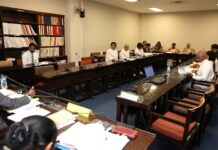The Monetary Board of the Central Bank of Sri Lanka imposed a 100% cash margin deposit against the import of selected goods of non-essential or non-urgent nature category including mobile phones, televisions, watches, refrigerators, fruits, air conditioners, wine and beer.
Issuing a statement the CBSL said yesterday, September 9, that the decision had been taken at a meeting held on Wednesday, September 8. Imports mentioned above, made under Letters of Credit and Documents against Acceptance terms with Licensed Commercial Banks and National Savings Bank, will be affected with immediate effect.
“The decision to impose the cash margin deposit requirement is expected to support the ongoing efforts to preserve the stability of the exchange rate and foreign currency market liquidity, particularly by discouraging excessive imports of speculative nature,” the CBSL said.
A summary of product categories that are subjected to cash margin deposit requirements are: Telecommunication devices (such as mobile telephones and fixed telephones), home appliances (such as fans, TVs, refrigerators, washing machines, digital cameras, hair clips, heaters, lamps, ovens), clothing and accessories (such as babies’ garments, hosiery, jerseys, nightdresses and pyjamas, overcoats, shirts and blouses, suits, track suits and swimwear, T-shirts, underwear, footwear, watches, sunglasses, other accessories), household and furniture items (such as furniture, lamp and lighting fittings, ornamental products, tableware and kitchenware, bed linen), rubber tyres, air conditioners, fruits (such as fresh apples, grapes, oranges and dried fruits, fruit juices), cosmetics and toiletries (such as perfumes, makeup preparations), beverages (such as beer, wine, mineral water and other beverages), other food and beverages (such as cereal preparations, starches, chocolates, malt, fish fillets, cheese, butter) and other non-food consumables (such as musical instruments, tobacco products, toys, stationery).
The total import cost of these items in 2019 was USD 1.05 billion in 2019, USD 871.2 million in 2020 and USD 753.4 million between January and July 2021.











